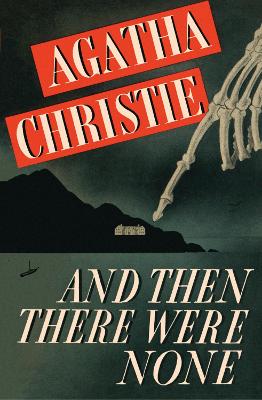Reviewed by Michael @ Knowledge Lost on
And Then There Were None was originally titled Ten Little (I would rather not say) after the British nursery rhyme. The US edition used this title (which is also the last line of the rhyme) as well as changing the song to Ten Little Indians. Once again the novel was revived and now the song title has been changed to Ten Little Soldiers. Apart from the offensive name of the book originally, this novel was wildly successful and introduced a very common crime trope into the world. Ten people trapped in a house on an island trying to work out who is killing them off one by one. I’m sure you can think of many films, shows and books that have paid homage to this theme.
This classic crime novel looks at the idea of administrating justice; who has the right to judge others, and what happens when the law fails. I’m going to try to avoid spoilers and tell you who the killer is but most people would have read this and probably remember who the perpetrator was. The killer believes the others are complacent and in most facts while they deny being guilty publically are living tormented lives. Not everyone, but it was interesting to see that kind of turmoil and I was a little upset to see that wasn’t explored in greater detail. Having said that, I think the torment played out more in the symbolism and motifs. I’m thinking about the dreams and hallucinations (the guilty consciences of the victims are explored here) or the storm; a symbol of violence that cuts them off from the world.
The killer has set out to commit the perfect crime and it looks good on paper but I never really bought into it. While reading this novel I had a feeling that the cosy crime approach is playing against the story. If you think about the mess made from the violent murders, wouldn’t help the police work out what happened in the end? I’m sure they wouldn’t rely on the handwritten accounts, the evidence would be inconsistent. Making this far from a perfect crime (sorry this is hard to explain without spoilers).
This was my first Agatha Christie novel and while I enjoyed it there is one thing that frustrated me. I hate crime novels that hold back important pieces of evidence and expect the reader to work out what happened. I always feel like the author is trying to be smug but really it is just poorly executed writing. It wasn’t so bad in this novel but I get the feeling it is a common occurrence in all her novels and I can’t stand that. You have to make a great protagonist to make up for the withholding of information. It works better as a first person narrative; the unreliable narrator is more likely to forget to tell you important clues.
I will read some more Christie, I hope I’m mistaken about the withholding of clues. And Then There Were None had no real protagonist but maybe a Hercule Poirot, Miss Jane Marple or Tommy and Tuppence mystery hide this a little better. I suspect Murder on the Orient Express will be my next Agatha Christie read but who knows. I prefer my detectives a little more Hard-Boiled so it might be awhile between Christie novels.
This review originally appeared on my blog; http://literary-exploration.com/2013/12/29/book-of-the-month-and-then-there-were-none/
Reading updates
- Started reading
- 19 December, 2013: Finished reading
- 19 December, 2013: Reviewed
